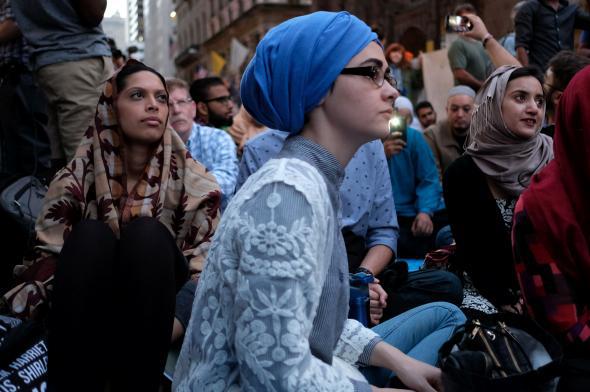Lately I’ve seen several articles by both centrist and center-right pundits, none of them friends of Donald Trump, warning that we should be wary of removing the president from office because it will anger his already very angry supporters.
“To overturn the results of an election is bound to alienate most, if not all, of the voters whose winner was repudiated—and perhaps many on the other side who recognize that, under different circumstances, the same might happen to them,” writes Robert Samuelson in the Washington Post. In the Atlantic, Jon Grinspan, curator of political history at the Smithsonian Institution, looks back to the tumult of Andrew Johnson’s impeachment, saying, “Americans live in far more peaceful times today, but it’s not difficult to imagine how impeachment could rile an already agitated nation.” Charles Cooke of the National Review argued that calls to remove Trump via the 25th Amendment (which allows the vice president and a majority of the Cabinet to declare a president unfit) fail to reckon with “how much of a psychic shock such a move would inflict upon this country—especially on those voters who backed and liked Donald Trump.”
Somehow there seems to be a lot less concern about the psychic shock inflicted upon the people who voted against Trump, who now know that his victory was assisted by a Russian intelligence operation and who watch, aghast, as Trump does everything he can to reward Russia for its help. Few pundits seem worried about Clinton voters’ trust in the rule of law when Trump blatantly ignores the Constitution’s Emoluments Clause. Nor have I seen anyone fretting about the damage to the stability of our democracy when a Congress that is largely controlled by a rural white minority discards the wishes of the anti-Trump majority, which desperately wants to see the president restrained. Indeed, polls show that between 43 percent and 48 percent of voters want Trump impeached. That’s a lot of alienated people! Shouldn’t we be anxious about their faith in our government’s legitimacy?
This lopsided concern for the tender feelings of people who march around in “Fuck Your Feelings” T-shirts is of a piece with all those post-election journalistic safaris into declining steel towns and white exurbs where Trump supporters flaunt their stubborn Trump loyalty. Perhaps I’m misremembering, but I can’t recall any similar anthropological snapshots of communities that strongly backed Barack Obama when his approval ratings were at their nadir. Nor do I remember any worries that Republican attempts to thwart Obama at every opportunity, and even steal a Supreme Court seat from him, would make his base question our system.
Certainly, the rage of the people who gave us Trump is important to understand. Despite the economic disenfranchisement of the white working class, it wields disproportionate political power, because, as Robert Griffin, John Halpin, and Ruy Teixeira report in the American Prospect, they are clustered in swing states and swing congressional districts. Their suffering—and the resentments bred of it—have taken the country to a place of inconceivable peril. But if their bitter disaffection is uniquely dangerous, it’s not uniquely valid. They’re not the only ones who get to decide whether or not the country is coming apart.
The reason we don’t worry much about furious Clinton supporters is that no one’s afraid of them. They’re disproportionately female and don’t parade around with firearms or gather in torch-bearing mobs. They’re not going to blow up a federal building. The right-wing pundit Erick Erickson even argues that liberals must not really believe what they say about the Trump regime because they haven’t started an armed rebellion: “If the left really does believe the Republican Party is a criminal enterprise in league with the Russians, they’re either moral cowards without conviction in their beliefs or about to take up arms to defend their country.” Implicit in this—as well as in all the hand-wringing about what the pro-Trump minority might do if they’re thwarted—is the idea that only people capable of violence need be taken seriously. That, in and of itself, is a sign of a political culture in crisis.
On Saturday, people are expected to take to the streets in at least 140 cities for the March for Truth, a mass demonstration demanding answers on Trump’s relationship to Russia and Russia’s involvement in the election. The organizers, who came together on Twitter, aren’t calling for impeachment. Their demands include the creation of an independent commission to investigate Trump and Russia, perhaps akin to Watergate’s Senate Select Committee; the release of Trump’s tax returns; and the prosecution of any wrongdoing ultimately discovered. People all over the country—including in such out-of-touch elite bubbles as Pottstown, Pennsylvania, Lexington, Kentucky, and Anchorage, Alaska—are planning to demonstrate because they fear America is becoming a lawless place, with a government whose legitimacy and essential patriotism is in doubt.
Already, Republicans are trying to normalize the idea that even if collusion between Trump and Russia is found, it doesn’t discredit the administration. If they succeed—if any sort of collaboration between the Trump campaign and Russian intelligence is found but doesn’t end his presidency—it will be a betrayal of the American voting public. You think impeachment threatens America’s civic fabric? Try telling the majority of American citizens that even if their hated rulers are revealed as traitors, there’s nothing they can do about it.
